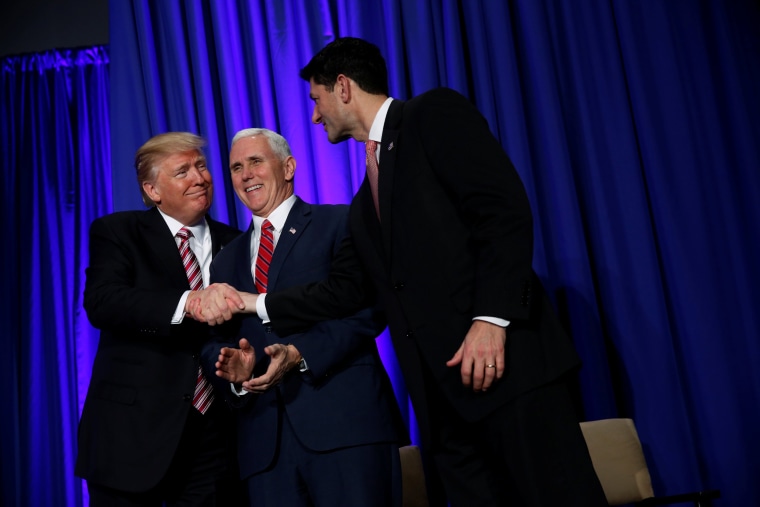PHILADELPHIA — Republicans left their highly anticipated retreat in Philadelphia with cautious optimism about their immediate future.
Optimistic because of their political fortunes — control of two branches of government — but cautious because of the complexity of their ambitious agenda further complicated by an unpredictable president.
House and Senate Republicans began their two-day session not how they anticipated: sidetracked by what some admitted to be "distractions."
Hoping to focus on their six-year long mission to undo the last president’s signature achievement, the Affordable Care Act, they were forced to respond to a new president invoking his own priorities without notifying his Congressional partners and Trump's obsessions over his legitimacy and popularity.
The opening news conference left members of the House and Senate leadership having to answer if they believed up to five million people voted illegally and if the U.S. should bring back interrogation tactics that both the U.S. and the international community have deemed torture.
But by day two, House Speaker Paul Ryan and Senate Majority Leader Mitch McConnell took control of the message.
"We are on the same page," Ryan told reporters Thursday morning. Ryan and McConnell downplayed any disagreements between the administration and Congress and insisted that the party is united.
But even the appearance of unity is difficult when expectations are so high. An audio tape obtained by the Washington Post confirmed what members alluded to when talking to reporters at their Philadelphia policy meeting: Republicans are far from a consensus on how to move forward on fulfilling campaign promises, especially on repealing and replacing the Affordable Care Act.
"You'll see different emphasis, but with respect to the core agenda we’ve laid out for our members ... we've done this in conjunction with the administration," Ryan said.
Republicans felt energized after the president's speech to them even though much of it broke with traditional Republican orthodoxy on issues of trade, infrastructure and even spending billions on a border wall.
"It's encouraging. This president is weighing in in a big way. So we’re eager to continue to work with him," said Rep. Kevin Brady, R-Texas, who leads the House Ways and Means Committee, which will do much of the work on health care and tax reform.
But caution is the tone of most conversations. Heard over and over again from Republicans was that the devil is in the details on both health care and taxes, the two first issues set to come down the pipe and could be politically perilous.
And beyond Trump’s 25-minute long pep rally where he mostly imposed his priorities to members, they’ve received little guidance from the administration on specifics and how to navigate any political ramifications that could incur from changing someone’s health care plan or taking away a person’s tax break.
"At some point I’m hoping to hear from the administration what they’d like to see in a health care replacement package and how they'd like to see it done,” said Rep. Charlie Dent, R-Penn.
Republicans are having to deal with questions of how to address Medicaid, a program Republicans would like to reduce but which has been expanded to include more low-income people as a result of the ACA.
They’ll also have to figure out how to ensure that the millions of people who gained health insurance, many through the help of government subsidies, won’t lose insurance. And they have to figure out how to pay for any plan they come up with.
A fear is that Congress will do weeks of work, holding hearings, writing legislation, consulting with relevant industry groups and the White House will undercut their work with an unexpected plan.
Lawmakers had no indication that any of Trump’s executive actions would come down in his first week and even the head of the House Energy and Commerce Committee — which is the other main health care legislation writing committee — Rep. Greg Walden, R-Oregon didn’t know if the administration would propose their own plan on health care or let Congress take the lead.
On tax reform, Ryan admitted that it’s complicated, but insisted that the party’s unified on the underlying principles.
"We are in a very good place on tax reform," he said. "It can get complicated when you get in the details of tax reform but once we go through how tax reform works and what it's going to take to get the kind of competitive tax system and competitive tax rates I think most people agree this is the right approach."
House leaders, including Brady and Ryan, were pleased that Trump's White House Press Secretary Sean Spicer indicated Thursday that they are considering a border adjustment tax, essentially a tax on imports coming into the U.S., to pay for a border wall with Mexico. It's a proposal that House leaders, including Ryan and Brady, are supportive of.
Brady was pleased with Spicer’s announcement, calling it "extremely pro-growth."
Spicer later walked back his comments on the tax.
"It's a work in progress," Dent said of the relationship between Congress and the president.

